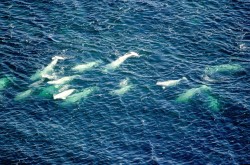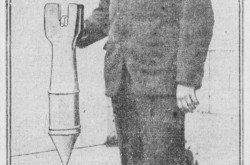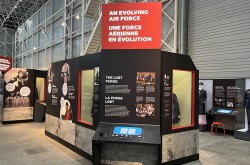Adventures with G-AKDN - Chapter 4
I was working in my hangar one winter evening, 14 years ago. My friend James Brooke dropped by. I had met James years before when he volunteered to fly one of our fleet of Aircoupes that we were donating flights to the EAA Young Eagles program. James was a mathematics Professor at the University of Saskatchewan. He had spent time working in the UK and had a soft spot for British aircraft. That night he had brought over a list of RAF Bulldog military trainer aircraft for sale by auction in the UK. As we looked over the listings we discovered at the bottom of the page, this one simple line: “deHavilland Chipmunk no.11 G-AKDN.”
Wow! Of all the Chipmunks in the world to own this would be the most special one! James’s love for the Chipmunk was equal to mine. I got really excited about the idea of bidding on G-AKDN. Then James informed me, “this listing was over 2 years old!” What! Was I ever disappointed? This was the Chipmunk of my dreams. In my mind, it was another Canadian National Treasure. I wondered where it was now.
James left and went home to do some investigation. He soon discovered the airplane had been pulled from the auction and sold privately to a man named Phil Derry who lived in Yorkshire, UK. James just happened to be leaving for the UK for Easter and tracked down Mr. Phil Derry. He asked Phil if he was any relation to the famous deHavilland test pilot John Derry? Phil answered that he was John’s first cousin, once removed. James asked how he came to own KDN. Phil said he had heard over a beer, that John Derry’s airplane was up for auction. So he contacted the seller, convinced him to pull it from the auction and sell it to him. Phil didn’t tell his wife Jackie, but later at a party, someone asked about him buying a Chipmunk. Jackie thought he’d bought a pet! Lucky she is a good sport and Phil kept the airplane, with which he and his two sons did some initial flight training. James arranged to visit Phil and have a look at KDN, tucked away in a dark corner of a hangar at Bagby Airfield, Yorkshire. It was painted in a 1970’s sun burst pattern of white with yellow and black. A high visibility scheme good for flying in the busy UK airspace, but certainly disguised its heritage and beautiful lines. Learning about our enthusiasm for KDN’s history and our desire to own and operate it, Phil decided to part with it.
Back in Saskatoon, we consulted with a local Chipmunk expert, Tom Coates, about how to dismantle and secure a Chipmunk in a shipping container. Keep in mind I had only had one short flight in a Chipmunk years before and James and Karen had never sat in one. We knew almost nothing about the mechanics and operation of the type. Tom loaned us some support brackets, and with suitcases full of ratchet straps and hardware, James, Karen and I boarded a flight to the UK. Phil picked us up at York and drove us to his beautiful country home on a hill overlooking a small village. We set off next day to arrive at Bagby Airfield, a small aerodrome situated on a hillside in Yorkshire. It has a small, sloping grass runway, running between some metal and wooden hangars. A funky clubhouse and tower made up the office, pilot lounge and necessary kitchen for making tea. It looked nothing like any airport we had seen in Canada. I felt like we were on a Hobbit movie set. Lucky for us, Graham Fox Aircraft Engineering is based in a hangar complex behind the tower. Graham turned out to be a lifesaver for us. He had experience with Chipmunks and KDN in particular. He initially kept a low profile. I think he was sizing us up. Who were these Crazy Canucks, dropping out of the blue, expecting to dismantle KDN, and put it in the big brown shipping container that had arrived a few days before?
Karen, James and I went over to the big dark metal hangar and found KDN still sitting in the far back corner. This was Karen’s and my first sight of KDN. A quick walk around and I was very excited. Even with a layer of dust and poor paint, I could see it was a diamond in the rough. When I got in and sat down in the pilot seat and took the controls, I thought someone had disconnected them! The stick, rudder and elevator had no tension, and just flopped around. It wasn’t until I looked out to the wing to see the ailerons following my every move that I realized just how light and precise the Chipmunk controls were. I found out later that they feel just as nice while flying, as they do on the ground. Wow. I am sitting in a Chipmunk and it’s ours!! Dreams do come true.
to be continued...



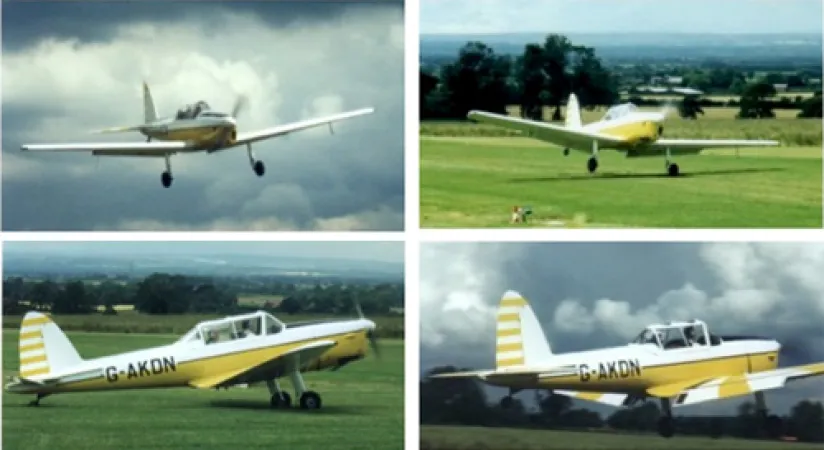

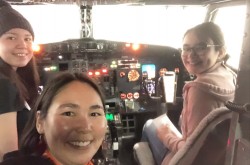
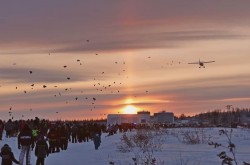

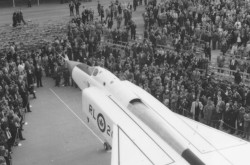
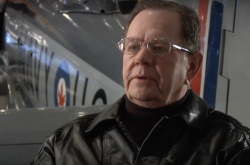








![A block of photographs showing some of the people involved in the bombing of beluga whales in the estuary and gulf of the St. Lawrence River. Anon., “La chasse aux marsouins [sic]. » Le Devoir, 15 August 1929, 6.](/sites/default/files/styles/thumbnail_7/public/2024-09/Le%20Devoir%2015%20aout%201929%20page%206.jpg?h=584f1d27&itok=TppdLItg)
